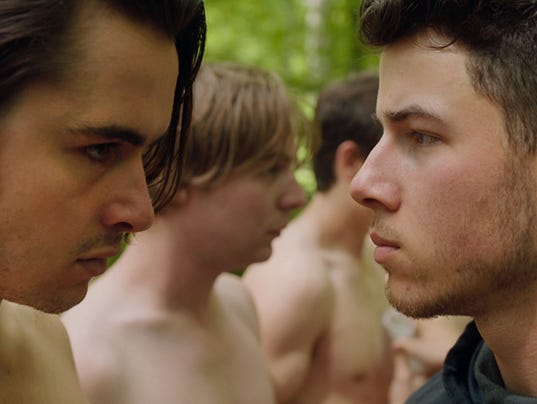
What if Lord of the Flies took place in a frat house?
That’s the question director Andrew Neel wanted to explore in Goat, one of two new movies turning the lens on bullying in its many forms. Netflix’s Audrie & Daisy (now streaming and in select theaters) is a documentary about two high-school victims of sexual assault, while Goat is a college-set drama based on Brad Land’s 2004 memoir of the same name. The film (available through video-on-demand services and in select theaters) follows Brett (Nick Jonas), a womanizing fraternity brother who becomes disillusioned with Greek life as he watches his younger sibling, Brad (Ben Schnetzer), endure humiliating and potentially fatal hazing rituals.
“The desire to belong, especially as a young man, is a very powerful thing,” Neel says. Pledging a fraternity is particularly important to Brad, who was attacked and robbed coming home from a party the summer before college. He turns to excessive drinking and partying as he wrestles with his masculinity, even watching violent porn in the days following the incident.
“He’s been thrown into a very uncertain place and he’s re-examining who he is as a man,” Neel says. “It’s part of this amorphous male experience that he’s going through.”
Goat doesn’t address sexual assault on college campuses. But the standard of male behavior in some fraternities “certainly encourages an environment in which misogyny and potentially sexual assault may be more likely,” Neel says. “When the most violent, aggressive, negative parts of the male psyche are exaggerated, that probably spells trouble for women.”
Which is why filmmakers Bonni Cohen and Jon Shenk hope Audrie & Daisy will help educate young men and women about rape culture and consent. The documentary shares the harrowing stories of two teens whose sexual assaults made headlines in 2012. Fifteen-year-old Audrie Pott killed herself after she was assaulted while passed out at a party in Saratoga, Calif., and naked photos of her went viral on social media. Daisy Coleman, then 14, was similarly cyberbullied and attempted suicide after speaking out against her alleged rapist (a high-school football star) in Maryville, Mo.
“These cases are the effect of a society that hasn’t quite figured out how to deal with the new tools of social media, and how to guide our young boys and men into healthy views of relationships (with) girls and women,” Shenk says. Having assaults broadcast on social media is especially devastating for victims, who “wake up Monday morning and go to school, and this thing that they’re still processing is suddenly floating out among their peers.”
But social media can also be an invaluable tool in driving the conversation around assault. Rape survivor Delaney Henderson reached out to Daisy online and invited her to a support group of teens who had gone through similar experiences. A young woman’s powerful letter to her attacker, former Stanford University swimmer Brock Turner, went viral this summer, while the cast of The Birth of a Nation (in theaters Oct. 7) has used filmmaker Nate Parker’s college rape trial (he was acquitted) as a jumping-off point to discuss sexual assault in interviews and columns.
Social media “has given us an opportunity now to have this conversation more boldly,” Cohen says. “There’s enough outrage, enough discussion on the national level, that we believe things are going to have to change.”
[Source:-USA Today]
